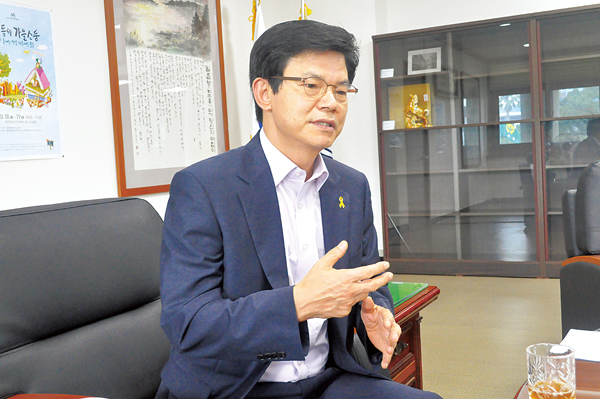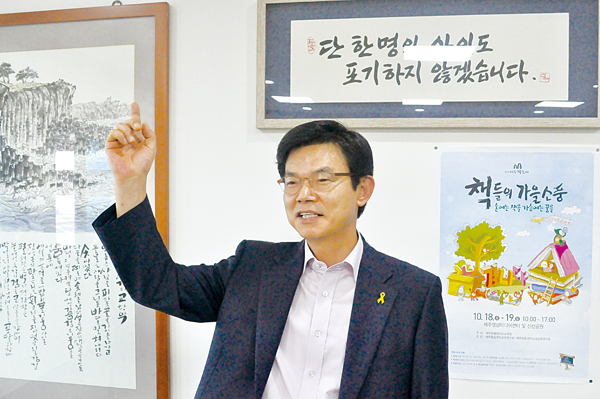| |
 |
|
| ▲ Lee Seokmun explains his pledges on behalf of Jeju’s children. Photo by Darren Southcott |
Lee Seokmun, Jeju’s 15th education superintendent, was inaugurated on July 1, 2014, and with his vow to never give up, “even on one child,” he is striving to make schools a happier place for Jeju’s children.
He comfortably won the June election after securing 33.2 percent of the vote, ahead of Ko Chang-geun in second at 26.9 percent. He will now direct the island’s education policy until 2018.
Prior to taking office he was a member of the Jeju Special Self-Governing Provincial Council Education Committee and chairman of Jeju Education Development Research Institute. He was also regional head for the Korean Teachers and Educational Workers' Union (KTU).
Lee worked for 25 years in Jeju middle and high schools and hopes to return one day, “to become a better teacher.” He is particularly keen to apply what he has learned since leaving the profession, and to ensure all students are afforded a quality education.
“My slogan is, I never give up even on one child,” he said. “It is heartbreaking that some students drop out of school without ever achieving their potential.”
Creating happy schools
While meeting with The Weekly in his Jeju City office, Lee explained how his experience in schools had fed into his desire to go “back-to-basics,” focusing on education quality rather than results.
In addition to decreasing the amount of student assessment, Lee has also vowed to promote communicative teaching methods over didactic top-down approaches, increasing discussions, teamwork, individualized assessment and after-school sports programs.
Although his early moves might be regarded as progressive, Lee resists such subjective pigeon-holing, saying people are free to interpret his new policies as they wish.
“We should overcome [such] labels. I would describe myself as an educator who loves children. All educational policies should focus on children’s happiness. If a superintendent is not an educator, but instead a politician, it negates this principle,” he said.
Happiness is a word that crops up a lot, both in the interview and in press coverage of Lee’s short tenure, and he returns to its importance. Although just two months into the job, having arrived mid-semester, he has been quick to support Park Geun-hye’s exam-free semesters in Jeju middle schools, a policy announced by Seoul in June of last year and trialed in two Jeju schools already. Lee says it will be the start of “a positive change in education” as it is rolled out across the province.
“Globally, we have achieved great [education] results. However, for high school entrance we have neglected students’ diversity and personalities. Especially regarding their futures, students don’t have any time to contemplate their desires or the job market. Therefore, this exam-free semester will give them this opportunity,” he said.
The additional free time, says Lee, will arm students with the skills to better negotiate the uncertainties they will face in the job market.
“In the 21st century, we need to focus on potential rather than brains and experience. We face a complex and uncertain environment, and a future that is unknown. Rather than present abilities, the focus should therefore be on our potential to learn new things.”
Lee doesn’t feel that the overbearance of high school entrance exams in Korean education will negate any attempts at reform, also pledging to tackle these in due course, believing they “drain children of their creativity and potential.” With such high hopes for change it is not surprising Lee asks for time before being judged.
| |
 |
|
| ▲ “My slogan is, I never give up even on one child,” Lee Seokmun emphasizes. Photo by Darren Southcott |
Creating safe schools
Although the movement toward well-being and healing in Korea has deep roots — Park Geun-hye made societal happiness the foundation of her successful 2013 election campaign — the real paradigm change, says Lee, was the Sewol ferry disaster in April of this year, which left 294 dead, mostly high school students, with 10 missing and presumed dead. The tragedy focused people’s minds on building a safer society and more caring schools for the nation’s children.
Parents are increasingly highlighting the deleterious effect the education system has on children with diverse learning styles, or who just fail to keep up the relentless pace. High rates of suicide and depression are also linked to the high-pressure education culture and Lee says he will bring in mobile teams of counsellors to support students suffering from, or deemed at risk of, depression.
“Parents are asking for education which prioritises children’s safety, health and happiness,” says Lee, who clearly expresses his passion for ridding Jeju’s schools of grade wars, bullying and violence.
Changes ahead
Although student happiness is clearly where Lee is seeking to make his mark, he has also pledged to cut red tape, increase multicultural education, provide environmentally-friendly school lunches, remove high-school fees and even push back school start times to 9 a.m.
In a move which is likely to affect many of Jeju’s international teaching cohort, he also says he will “adjust English native-speaker [teacher] numbers,” mirroring the trend for cuts across the nation. He confirmed to The Weekly that he believes there are sufficient Korean teachers with advanced English skills to address the “over-reliance” on the expensive EPIK program. He stresses, however, that there will always be a role for native-speaker teachers, such as in facilitating intercultural communication and motivating students, but he suggests the gradual scaling down of the program makes financial and educational sense.
All of these changes take time, however, and Lee stressed that taking office mid-semester has somewhat limited the changes he has yet been able to bring in. He says that from next year we can expect to see an education system which is more reflective of his educational philosophy. When asked what this means, he says:
“I want children to grow, and I want them to enjoy this growth.” |





















